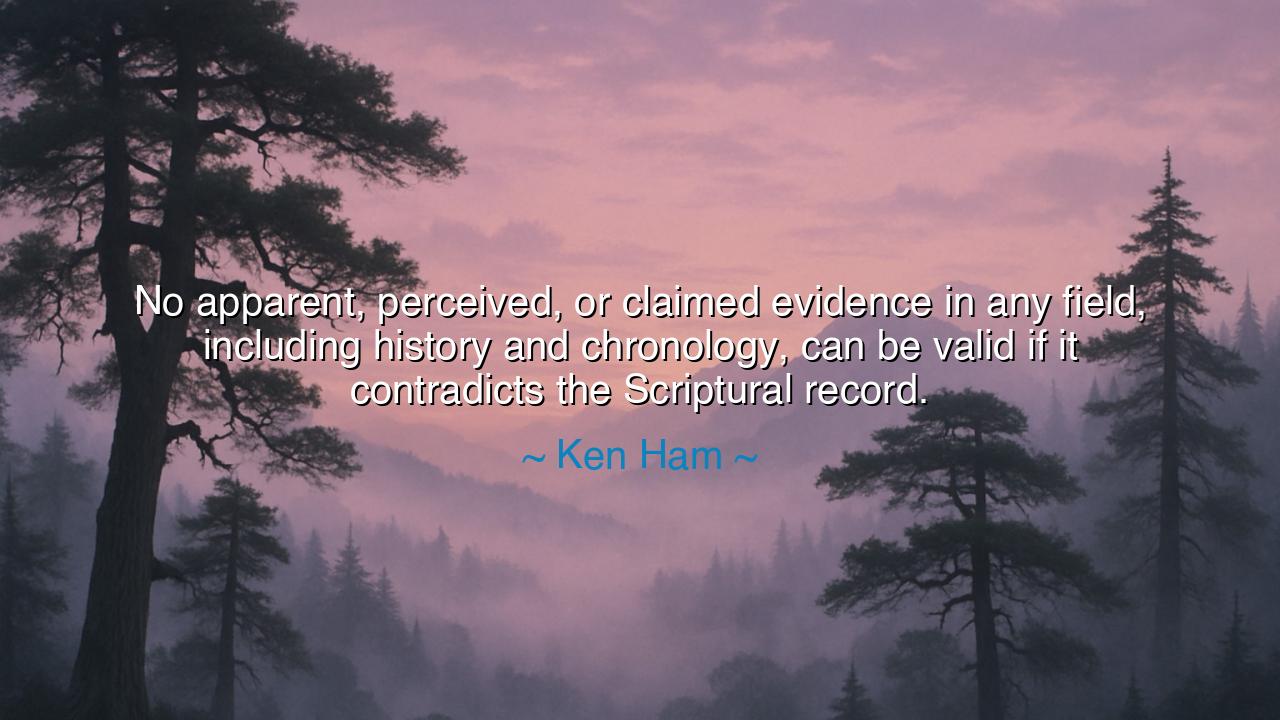
No apparent, perceived, or claimed evidence in any field
No apparent, perceived, or claimed evidence in any field, including history and chronology, can be valid if it contradicts the Scriptural record.






“No apparent, perceived, or claimed evidence in any field, including history and chronology, can be valid if it contradicts the Scriptural record.” – Ken Ham
Hear now, O seekers of wisdom and faith, the solemn words of Ken Ham, a defender of the ancient Scriptures and founder of the modern Creationist movement. In this declaration, he does not merely argue for doctrine, but speaks from the conviction that truth itself has an origin—and that origin is divine. When Ham says that no evidence, no theory, no claim in any field can stand if it contradicts the Scriptural record, he proclaims a worldview rooted in sacred certainty: that revelation stands higher than reason, that the Word of God is the measure by which all other knowledge must be tested.
To understand his meaning, one must first see the heart of his faith. For to Ham, the Scriptures are not a book of metaphor or moral tale—they are the blueprint of reality, written by the Creator Himself. The “record” he defends is not man’s history, but God’s history, a testimony of beginnings, purpose, and destiny. In a world that shifts with theories and discoveries, he clings to a truth he believes unchanging: that God’s Word cannot be overturned by the word of man. His voice, then, is not one of rebellion against knowledge, but of loyalty to the source from which he believes all knowledge flows.
Such a conviction is not new. It echoes the struggles of the ancients—of Galileo, who stood before the Church, defending the motion of the heavens, and of the Church itself, which feared that human observation might dethrone divine revelation. In every age, there has been this tension: faith and inquiry, belief and observation, the eternal and the temporal. Ham’s words stand firmly on one side of that eternal debate. He reminds his followers that to question the foundations of Scripture is to unmoor the soul, to drift in a sea of uncertainty where truth becomes relative and meaning dissolves.
Yet his stance also reveals a deeper truth about humanity: the yearning for certainty in a world that constantly changes. Science evolves, philosophies fade, empires rise and crumble, but the sacred text—unchanged through centuries—offers a foundation that feels eternal. To those who live by faith, this is not stubbornness, but devotion. It is the same devotion that moved the martyrs of old, who faced the fire rather than deny their faith; the same courage that inspired prophets to speak truth in defiance of kings. Whether one agrees or not, one must honor the spirit of conviction that chooses revelation over speculation, the divine over the doubtful.
Still, history teaches that faith and reason, though often at odds, need not be enemies. Consider the life of Isaac Newton, who gazed into the laws of the universe with mathematical genius yet declared that his discoveries were but the uncovering of God’s design. He believed that every law of motion, every force of gravity, was a whisper of the divine order. To Newton, science did not contradict Scripture—it confirmed it. Perhaps this is the higher harmony that thinkers and believers alike must seek: not the silencing of one voice for another, but the recognition that all truth, rightly understood, springs from the same eternal source.
Ken Ham, however, warns of a danger that arises when human pride seeks to exalt itself above revelation. To him, the sciences that claim to disprove creation, or the histories that deny the sacred record, are built upon fragile sand—ever changing, ever uncertain. He calls upon believers to hold fast to the rock of Scripture, to measure all evidence by the divine Word, not the other way around. His is a cry for steadfastness in an age of doubt—a reminder that the pursuit of knowledge without reverence can lead to arrogance, and arrogance to ruin.
Let us, then, take from his words a lesson both ancient and enduring: build your foundation upon what you believe to be eternal. Whether your temple stands on revelation or reason, let it be built with conviction, not convenience. For the one who believes nothing deeply is blown by every wind of thought, but the one who stands rooted in purpose endures. And let us remember, too, that truth is not diminished by questioning—it is strengthened by it, for only the truth that survives the fire of inquiry is worthy of our faith.
And thus, O listener, the wisdom of Ken Ham resounds across the ages: hold fast to your foundation, but seek understanding with humility. The Scriptures, to him, are not merely ancient writings—they are the voice of eternity speaking into time. Whether one agrees or challenges his view, his words call all who hear them to examine what they trust most deeply, and to ask: Upon what am I building my truth? For in that answer lies the design not only of knowledge—but of the soul itself.






AAdministratorAdministrator
Welcome, honored guests. Please leave a comment, we will respond soon